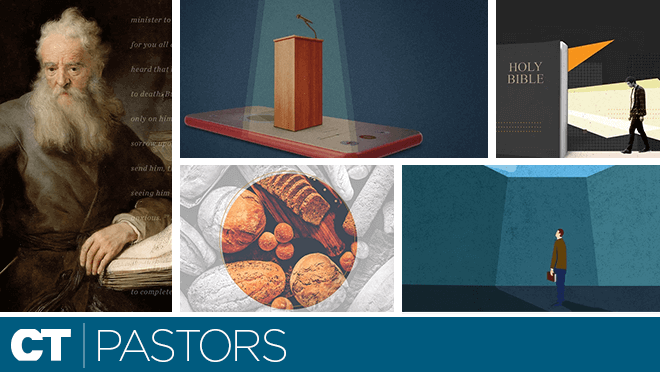After Tom Burns, a Dallas-based marketing executive, went through the worry and stress of unemployment two years ago, he didn't forget what he experienced once he found a new job. Instead, as he reflected on the questions he wrestled with—How will I feed my family? How will I make my house payment?—he became determined to help others suddenly faced with the fallout of a job loss.
His determination turned into a ministry, Career Solutions, which he launched at his church, the First Baptist Church of Dallas.
Career Solutions serves as one primary example of dozens of ministry efforts and programs launching across the country. As the U.S. jobless rate surpasses 9 percent—and some project 10 percent by the end of the year—many church leaders see an increasing opportunity to minister to members and reach out to the community.
"As Christians, I believe it's our duty to do whatever we can for others, and offering these kinds of services to the growing numbers of people who find themselves needing them is important," says Beth Wheatley-Dyson, pastor of St. Andrew's Episcopal Church in Hanover, Massachusetts.
Unemployment in Massachusetts is at its highest point in at least 16 years. St. Andrew's started workshops teaching participants how to deal with the stress and stigma of unemployment and how to write resumés. The church also sponsors guest speakers, such as officials from the local U.S. Small Business Administration office, to discuss how individuals can start their own businesses.
In Modesto, California, where shrinking education budgets have delivered pink slips to teachers as well as school staffs, the First Baptist Church of Modesto has sought methods to respond in more meaningful ways.
"There are many in this area who have found themselves out of work or suffering from deep cutbacks in their work," says Wade Estes, senior pastor of said the church. "People have lost jobs in the local school districts and construction has really slowed down. As a result, we have seen a dramatic increase in the numbers of people making prayer requests for work, more work hours, for concerns over losing their homes and other issues. Fortunately, we have also seen God work to provide jobs to those who need them."
Taking the Lead
Boston-based career coach Kathy Robinson says churches are an excellent resource for a job search.
"Churches are made up of people, and the more you get to know, the more who know you are looking for a job, the better the chances are that you will find an employer," she says. "This is a new idea for churches, but when they draw on their resources to get knowledgeable people to give guidance, it can be a wonderful resource."
Dr. Robert Jeffress, pastor of First Baptist Church of Dallas, says churches often miss a ministry opportunity.
"I'm not a career counselor, but I do know that as a pastor, churches are often, by their nature, very little help to the unemployed," he says. "Unfortunately, a church is often a place where someone with a need can get mixed into the crowd and go unnoticed. On the other hand, the church is also a body of people, people who can help each other when they know what their needs and resources are."
At First Baptist, Jeffress says the church views its resources as a way to meet physical needs, not just spiritual ones.
"I think that if we seriously look at all of the people and programs that we have in a church, we can come up with some great ideas to help others with employment problems," he says.
For instance, First Baptist created a special page on its website that displays the resumés of job-seekers. In order to make the website more useful, the resource is actively promoted to the local community, especially through other area churches.
"I think that the secret is to make sure that the program doesn't turn into a job bank or a pity party," Jeffress adds. "Ours is a proactive approach that helps those who need jobs to find them, especially in the economic climate we are finding ourselves in today. Our program was started at our church about one year ago, and people started applying to take part almost immediately."
Tangible Results
Not long ago, Janet Russell and her husband Joel found themselves out of work at the same time. Soon after she lost her job, Janet heard about the Career Solutions program, which she credits with giving her the tools and confidence she needed to find a good job. In fact, it wasn't long before she brought her husband, as she says, "kicking and screaming" to the group meetings. He soon found the information of value as well.
"I think that looking for a job has got to be one of the loneliest things a person has to do," she says. "One day you're at work, doing what you do to be useful, having a paycheck, enjoying the social aspect of working, then the next you're out with nothing, and no idea where to go or who to talk to so you can get back into the work-a-day world."
Career Solutions meetings taught Janet and Joel how to create an effective resumé, and gave tips for interviews and salary negotiations. The program also covered related topics for job-seekers, such as cutting costs and living on a budget.
Like Career Solutions, many programs run by churches around the country provide specialized presentations by experts, and then often continue with networking opportunities and skills practice time.
"The Career Solutions program isn't a warm and fuzzy, touchy-feely kind of group," Janet says. "Anyone is welcome to attend, but they had better be prepared to work, because fortunately, everyone who is there is employed full time in the job of getting a job. We don't play games. The results speak for themselves."
Jeffress says that about half of the Career Solutions participants find work from the information provided in the sessions.
"To be honest, we've even hired several people from the program to work in our church," he says. "I like to think of the Career Solutions program as finding a job God's way."
Helping After the Hire
Some churches offer help to participants even after they land a job as a way to help them stay employed.
For instance, at the United Methodist Church in Milltown, N.J., member Bob Stewart runs a career development, planning, and counseling program.
"This program helps practically anybody, whether they have a job or not," he says. "It doesn't matter if you don't have a job—it will teach you the skills once you do—or, if you have one, it will help you keep it."
Stewart's course covers a variety of topics, including ways to deal with—and manage—a difficult boss, how to control and improve job security, the do's and don'ts that affect job security, and techniques for workers to "bulletproof" their jobs. A future session will focus on performance reviews, he says.
True Ministry
Church leaders say they want to help unemployed people find jobs. But they also say their programs keep true ministry at heart: to help those participants become better people, too.
"I consider our program to be one that is responding to a need," Jeffress adds. "I'm not an employment expert, but we have encouraged feedback from participants in the Career Solutions program to determine exactly what their needs are so we can tailor what we offer that better helps them. It's just a matter of asking ourselves, 'Who could best serve this need?' and going out to ask for their help with the program. We're still in the learning stage, but as we continue to offer the program, we will learn more how to help the participants better."
That makes any of the costs involved with operating the programs worth it, church leaders say, especially since the costs often are minimal.
"Sure, it costs us something to keep this program going," Jeffress explains. "We have to turn on the lights, and there are [other] costs, but those are minimal. When we know that people are leaving our church knowing that they have become more savvy in their efforts to find a job, that's a big reward. In these cases, we all win: the church, the job hunter, the community, we all win."
Michael Michelsen is a freelance writer living in California.
Copyright © 2009 by the author or Christianity Today/Your Church magazine.
Click here for reprint information on Your Church.

Support Our Work
Subscribe to CT for less than $4.25/month

























